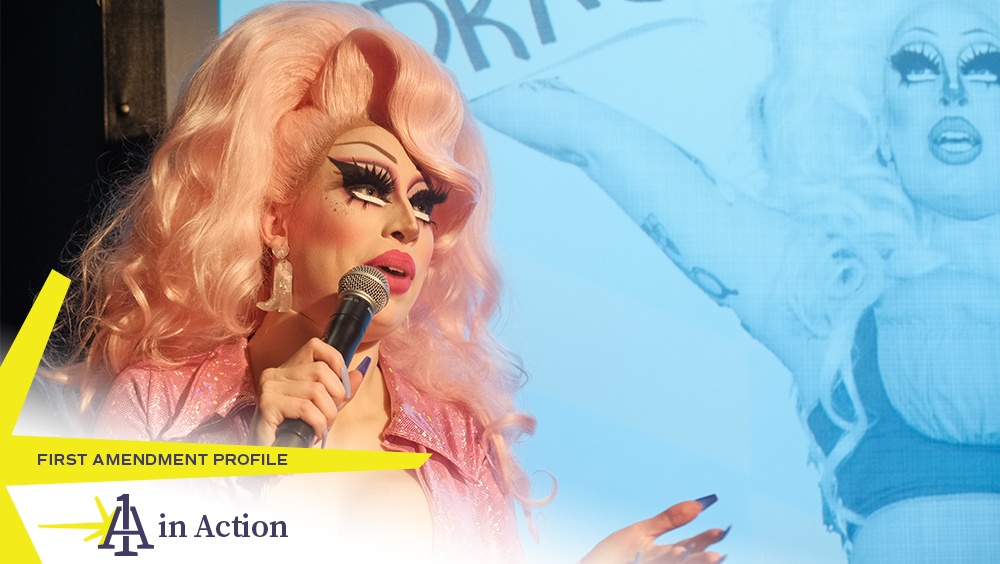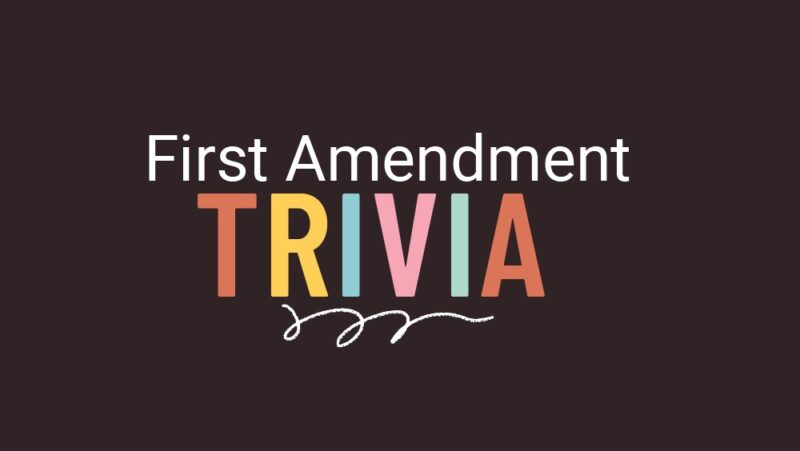1A in Action: Brigitte Bandit and Fighting for the Right to Perform in Drag

Texas drag performer Brigitte Bandit has big pink hair and a Dolly Parton vibe.
When Texas legislators proposed two laws to criminalize certain drag performances with children present and to punish drag story hours at libraries, Bandit spoke out and testified against the bills.
Bandit, who also performs for children’s events as Disney characters, spoke out about the lack of clarity in what the laws restricted, and how they applied unevenly to performers depending on their gender. She faced online harassment and doxing after speaking out.
Editor's note: This profile is part of an ongoing series, 1A in Action, which highlights individuals who fought for their — and other people's — First Amendment freedoms.
What’s at stake:
Free expression isn’t explicitly mentioned in the First Amendment, but how people dress, dance and perform on stage is broadly defined as protected free speech. Drag performances are one way of expressing yourself, like other forms of dance, comedy, singing and live performance. Dressing in clothes or wearing makeup different from gender norms is protected free expression. Attempts to ban such activities must meet a specific legal definition of obscenity.
What happened:
A photo of Bandit testifying in full drag went viral and was named one of Time magazine’s Top 100 Photos of 2023.
Testifying again, she donned a Texas flag-themed drag outfit and was escorted out of the chamber by police when she exceeded the two-minute time limit to speak.
Both laws passed, but in September 2023, a federal judge blocked one as violating the First Amendment.
What Brigitte Bandit says:
“I’ve always been very expressive, and I’ve always loved high femininity,” Brigitte said in explaining how she connects with drag. When she heard about the bills in Texas that she felt targeted her community, “I had to step up.”
Bandit believed one of the bills was “trying to push queer expression outside of public life,” and she believes it’s “really important that queer people are seen, and that kids know they can be whoever they want to be and express themselves however they want to be.”
Why it matters to you:
The First Amendment protects dressing in clothes or wearing makeup different from gender norms. Attempts to ban wearing clothes or makeup different from traditional gender norms in public or for performances would have to meet a specific legal definition of obscenity, which is not protected by the First Amendment.
@1stforall Are drag performances protected by the First Amendment? #Drag #DragQueen #FirstAmendment #FreeExpression #FYP #ForYouPage
♬ original sound - Freedom Forum
Brigitte Bandit’s inspiration:
“It’s important to stand up for your community, no matter if it affects you yet, because eventually it will,” Bandit said.
Testifying and speaking out against the bills made for one of the most difficult years of her life, she said, adding “I found a power in me that I would have never known I had otherwise.”
Ask an expert:
Brigitte Bandit’s story highlights two of the most important things to remember about the First Amendment. First, viewpoint neutrality is paramount. We all get to express ourselves without the government telling us which messages or forms of expression are better than others. Second, we all need to speak up when the government engages in viewpoint discrimination. Freedom of speech (and the freedoms of religion, press and assembly) cannot survive without free and active petition.
– Kevin Goldberg, First Amendment specialist, Freedom Forum
Learn more:
There’s more to learn about the freedoms of speech and petition and the First Amendment. Here’s more about the freedom of speech and some of its limits. Here’s more on the freedom of petition. And here’s much more about the First Amendment.
Keep in touch:
We’ll come to you. Sign up for our newsletter to get First Amendment news and resources in your inbox every week. And get in touch if you want to share a 1A in Action story of you or someone you know.
Student Press Freedom Day Trivia
Can Famous People Sue You for Criticizing Them? Actual Malice Explained
Related Content

